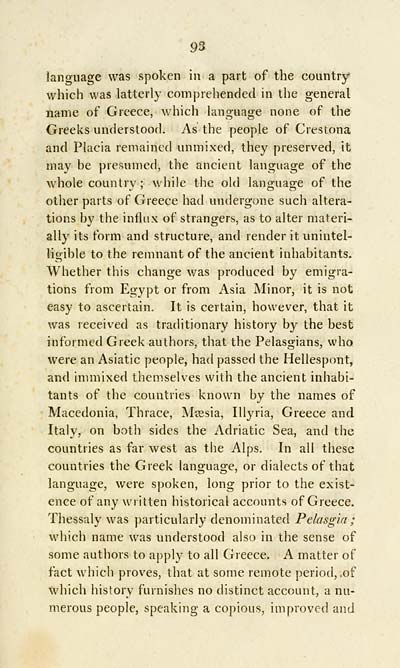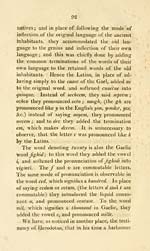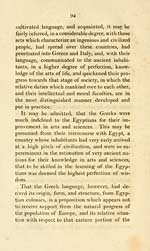Download files
Complete book:
Individual page:
Thumbnail gallery: Grid view | List view

93
language was spoken in a part of the country
which was latterly comprehended in the general
name of Greece, which language none of the
Greeks understood. As the people of Crestona
and Placia remained unmixed, they preserved, it
may be presumed, the ancient language of the
whole country ; while the old language of the
other parts of Greece had undergone such altera-
tions by the influx of strangers, as to alter materi-
ally its form and structure, and render it unintel-
ligible to the remnant of the ancient inhabitants.
Whetlier this change was produced by emigra-
tions from Egypt or from Asia Minor, it is not
easy to ascertain. It is certain, however, that it
was received as traditionary history by the best
informed Greek authors, that the Pelasgians, who
were an Asiatic people, had passed the Hellespont,
and immixed thcniselves with the ancient inhabi-
tants of the countries known by the names of
Macedonia, Thrace, M^sia, Illyria, Greece and
Italy, on both sides the Adriatic Sea, and the
countries as far west as the Alps. In all these
countries the Greek language, or dialects of that
language, were spoken, long prior to the exist-
ence of any written historical accounts of Greece.
Thessaly was particularly denominated Pelasgia ;
which name was understood also in the sense of
some authors to ai)ply to all Greece. A matter of
fact which proves, that at some remote period, .of
which history furnishes no distinct account, a nu-
merous people, speaking a copious, improved and
language was spoken in a part of the country
which was latterly comprehended in the general
name of Greece, which language none of the
Greeks understood. As the people of Crestona
and Placia remained unmixed, they preserved, it
may be presumed, the ancient language of the
whole country ; while the old language of the
other parts of Greece had undergone such altera-
tions by the influx of strangers, as to alter materi-
ally its form and structure, and render it unintel-
ligible to the remnant of the ancient inhabitants.
Whetlier this change was produced by emigra-
tions from Egypt or from Asia Minor, it is not
easy to ascertain. It is certain, however, that it
was received as traditionary history by the best
informed Greek authors, that the Pelasgians, who
were an Asiatic people, had passed the Hellespont,
and immixed thcniselves with the ancient inhabi-
tants of the countries known by the names of
Macedonia, Thrace, M^sia, Illyria, Greece and
Italy, on both sides the Adriatic Sea, and the
countries as far west as the Alps. In all these
countries the Greek language, or dialects of that
language, were spoken, long prior to the exist-
ence of any written historical accounts of Greece.
Thessaly was particularly denominated Pelasgia ;
which name was understood also in the sense of
some authors to ai)ply to all Greece. A matter of
fact which proves, that at some remote period, .of
which history furnishes no distinct account, a nu-
merous people, speaking a copious, improved and
Set display mode to: Large image | Transcription
Images and transcriptions on this page, including medium image downloads, may be used under the Creative Commons Attribution 4.0 International Licence unless otherwise stated. ![]()
| Early Gaelic Book Collections > Ossian Collection > Thoughts on the origin and descent of the Gael > (105) |
|---|
| Permanent URL | https://digital.nls.uk/82235704 |
|---|
| Description | Selected books from the Ossian Collection of 327 volumes, originally assembled by J. Norman Methven of Perth. Different editions and translations of James MacPherson's epic poem 'Ossian', some with a map of the 'Kingdom of Connor'. Also secondary material relating to Ossianic poetry and the Ossian controversy. |
|---|
| Description | Selected items from five 'Special and Named Printed Collections'. Includes books in Gaelic and other Celtic languages, works about the Gaels, their languages, literature, culture and history. |
|---|

